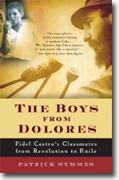The Boys from Dolores
Patrick Symmes
book reviews:
· general fiction
· chick lit/romance
· sci-fi/fantasy
· graphic novels
· nonfiction
· audio books
· author interviews
· children's books @
curledupkids.com
· DVD reviews @
curledupdvd.com
newsletter
win books
buy online
links
home
for authors
& publishers
for reviewers

 |
The Boys from Dolores: Fidel Castro's Schoolmates from Revolution to Exile Patrick Symmes Vintage Paperback 368 pages May 2008 |
|
When the former students of the Jesuit school known as Colegio de Dolores gather for their annual reunion, their nostalgic moments are more profound than most. In addition to lost youth, lost innocence, and lost loves, the Dolorinos mourn the loss of their homeland. “Unmoored” is how author Patrick Symmes describes The Boys from Dolores
Fidel’s classmate Lundy “didn’t like Fidel,” yet like many among the alumni, he was initially a supporter. “The moment he first saw the future, he said, was ‘on the third or fourth day of the Revolution’” Lundy went into Santiago where he encountered the ordinary people of Cuba, and one after another of them warned him of what was to come. “It’s going to be a government of the whip,” says one man. “If those guys [Fidel’s rebels] win power,” warns another, “hunger will come to Cuba.” These, then, were the true Profetas, predicting what Lundy and most of the other Dolorinos eventually saw to be true. “One of every ten Cubans have fled the island since Castro’s revolution,” Symmes tells us. Every one of them has a story worth telling, and it speaks well of the author’s determination that he tracks so many of the Dolorinos to hear those stories firsthand. Through their words, we begin to feel the ache and the disappointment, and we can almost understand why, more than a half century later, the exiles still dream of returning home. Symmes established himself as an above-average journalist when he followed the path of Che Guevarra’s The Motorcycle Diaries in order to write Chasing Che. In The Boys from Dolores As if mesmerized by the tale of Fidel Castro and the almost mythical island he controls, Symmes delivers a poignant portrait of the displaced Cubans, allowing the life of Fidel to unfold with dream-like patience through the remembered bits and pieces of others’ lives. Those born of my generation and afterward don’t remember a Cuba without Castro. The boys from Dolores who share their stories here probably don’t remember it accurately; one senses that they believe the usurper of their home and of their hope is a temporary aberration, a nightmare figure who will be vanquished allowing them to return to the idealized society they remember. Like El Profeta aka Lundy, who has fallen prey to Alzheimer’s, the memories of the exiles fade as that generation dies. Perhaps it is as Symmes speculates, “Cubans might become like the Jews, defined by their floating state, reciting what was lost in an ancient homeland.” Not a history of the Revolution or the politics, or of the life of that one man who appears to be the creator of modern-day Cuba, The Boys from Dolores Originally published on Curled Up With A Good Book at www.curledup.com. © Deborah Adams, 2008 |
|
|
|
 Click here to learn more about this month's sponsor! |
|
| fiction · sf/f · comic books · nonfiction · audio newsletter · free book contest · buy books online review index · links · · authors & publishers reviewers |
|
| site by ELBO Computing Resources, Inc. | |
 Symmes’ biography of the boys from Dolores School begins with a photo taken in 1942 of the 238 students then enrolled in the Colegio. Many of them would be worthy subjects for a biography – television icon Desi Arnaz; Luis Aguilar Leon, aka Lundy, best known for his article ‘El Profeta Habla de los Cubanos’; the Bacardi boys of rum fame—yet the central subject of this work is none of those but rather the student who never attends the reunions: the middle Castro son, Fidel.
Symmes’ biography of the boys from Dolores School begins with a photo taken in 1942 of the 238 students then enrolled in the Colegio. Many of them would be worthy subjects for a biography – television icon Desi Arnaz; Luis Aguilar Leon, aka Lundy, best known for his article ‘El Profeta Habla de los Cubanos’; the Bacardi boys of rum fame—yet the central subject of this work is none of those but rather the student who never attends the reunions: the middle Castro son, Fidel.